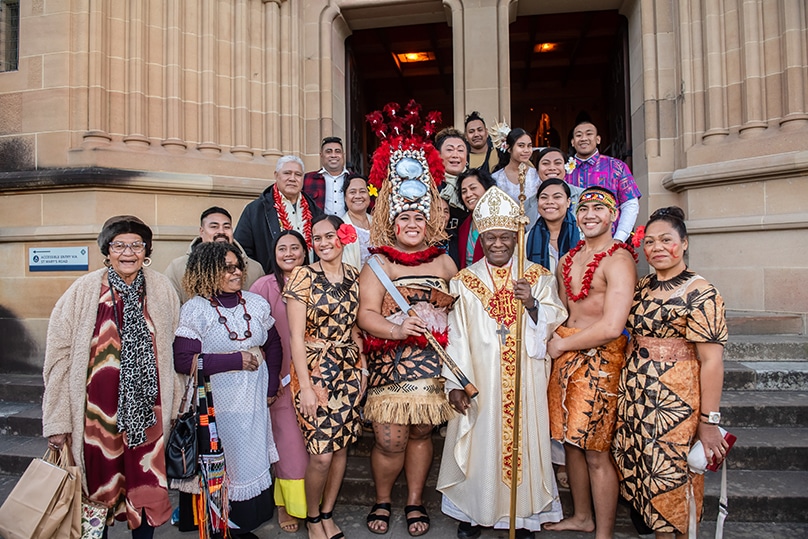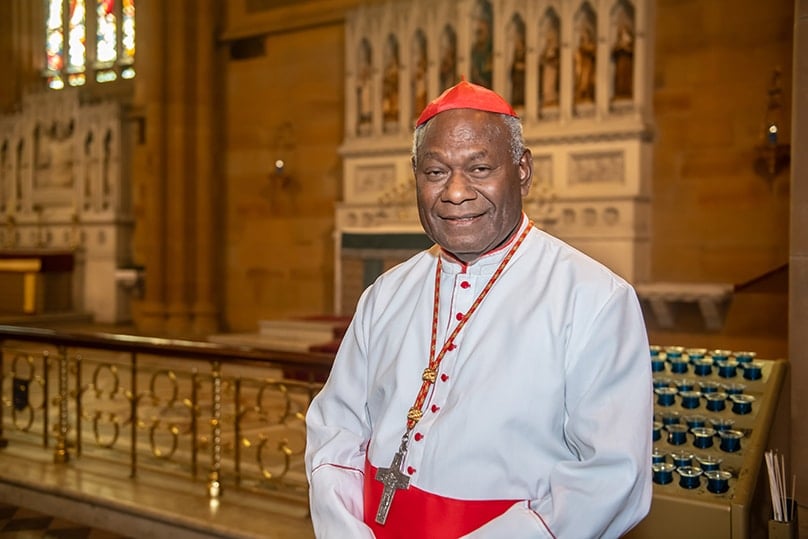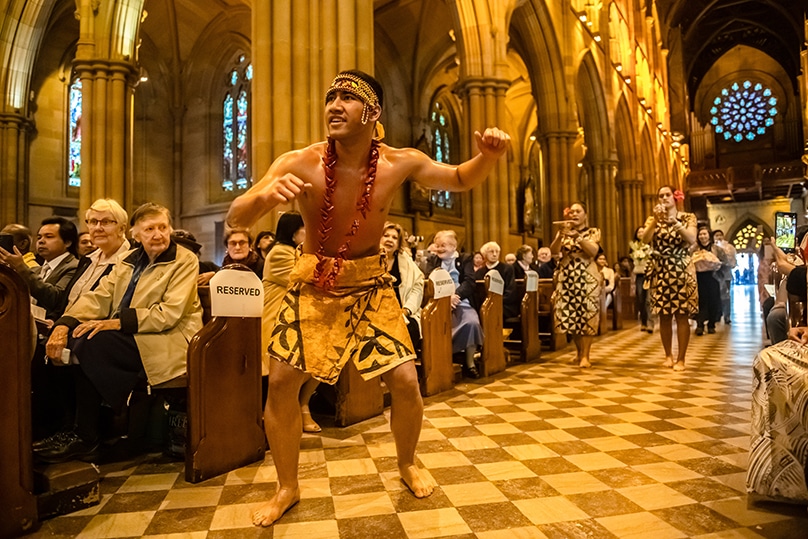
On Good Friday this year the young Catholics of the Archdiocese of Port Moresby led about a thousand people on a seven-hour Way of the Cross from its cathedral, St Mary’s, to St Charles Lwanga church in a northern suburb of the Papua New Guinean capital.
Cardinal John Ribat MSC celebrated Mass and then waited nearly three hours while his congregation came to venerate the large cross.
“You could see women and men crying before it, Catholics and non-Catholics together, and that was very touching for me to see,” he said.
The first large gathering of the church in PNG since the beginning of the COVID pandemic confirmed Cardinal Ribat’s belief that the only way to meet PNG’s serious material and spiritual challenges is by bringing people together.
Cardinal Ribat spoke to The Catholic Weekly while visiting Sydney for celebrations marking the 25th anniversary of the Australian MSC Mission Office.
He said when Pope Francis appointed him as PNG’s first-ever cardinal in 2016 he was surprised at the level of rejoicing in his country, where most of the population is Christian but less than half are Catholics.
“Not only Catholics but across the whole nation people said, ‘We are happy that you have been raised. We are now on the world map.’
“But Pope Francis’ heart goes out to the peripheries—he saw that the church is very much alive and growing there and he wants to bring that to the centre.”
While the church there is still vibrant with a steady flow of local vocations, he is kept awake at night by the disengagement of PNG’s youth from their culture, families and the church.
As the deputy president of the PNG Council of Churches he is proud that the various denominations are forming alliances to engage youth with responsibilities, like organising and running the annual Way of the Cross.
“We try our best to keep them together, because I can see that if we don’t handle the youth well then we are losing our future,” Cardinal Ribat said.
“Many young people are away doing their own activities, they’re not listening to their parents and they don’t follow anyone, and so I’m very concerned for our young people. The church needs to have good programs for them and be together with them.”

He also wants to do more for the young West Papuan refugees who have fled decades of violence in the Indonesian province on PNG’s western border.
After West Papua was annexed by Indonesia in 1969 after a widely-criticised “referendum,” Indonesian authorities have clashed with the indigenous people, leading to tens of thousands of refugees crossing the border into neighbouring PNG.
Cardinal Ribat was invited to lead the prayer at a welcome event for Indonesian president Joko Widodo during his 5 July visit and noted that a “very strong” police presence was likely indicative of the level of tension across PNG’s western border.
He said the Catholic Bishops Conference of Papua New Guinea and Solomon Islands runs an occupational training program for young West Papuan women but he dreams of doing more.
“The [Council of Churches] have not really discussed this but I think we really need to do more to help the West Papuans who have been forced out of their country,” he said.
In keeping with Pope Francis’ approach to integral ecology, Cardinal Ribat’s worries about youth are matched by his concern for PNG’s natural environment.
Last Christmas Cardinal Ribat visited his home in Volavolo, a village on the PNG island New Britain where people voiced their anxiety about the effects of climate change and foreign commercial seabed mining in their region.
“They were telling me that the big mining ships coming at night is very disturbing for them.
“‘We don’t know what they are doing and when they go will the sea be the same for us?’ they said.
“They are fearing for their livelihood. If people can provide for themselves from fishing and from their land they are happy, and they don’t need to rely on government welfare.
“But climate change also is very apparent to us who live on islands. Some of the smaller low-lying islands are being slowly washed away.
“Carteret islands of Bougainville have already been broken into two and people cannot grow their food crops in soil that has salt, it is no longer safe.

“In Ahus, another island I visited, the older people showed me where they had lived before and it was well into the sea already.
“The island is getting small enough so when a high king tide comes it washes over the land and over the other side.
“The young people will move away but the old people don’t want to leave their homes. They tell me they don’t know what to do.
“That is why I’m involved in advocacy against seabed mining and destruction of the environment.
“In seabed mining they say they will only scratch the surface of the reef, but in the process of that small thing, they already displace and destroy the whole system.
“At Ahus when the people used the reef for stones to raise the seawall they stopped when they realised it was affecting their fishing, but with [large-scale commercial mining] no one [living locally] will be there to supervise and make sure they only go so far and then stop.
“This is where I see a big problem and if the environment in the sea is destroyed how long will it take to recover and be restored, and how many marine lives will be destroyed? No one knows. It needs more study.”
With such a heart for his people and admiration for Pope Francis, Cardinal Ribat thinks the current emphasis on synodality in the church is necessary to counteract the relentless individualism promoted by modern culture.
“The people are learning about [synodality] and are supportive of it, saying that this could be the way forward for strengthening relationships with the church and uniting everyone,” he said.
“But of course, there are different opinions too. Some say we have been living this already for a long time, and now it’s just that the pope is talking about it.
“I see it this way: we are living in a different era and the spirit [of the world] at this time is trying to promote individualism with this [the cardinal lifts up his mobile phone] and with what you can do for yourself.
“It’s saying that you don’t need the whole group to come together if you want to do something, and so I think Pope Francis wants to remind us that there is a need to be together and continue to build on our communal participation in these fast-changing times.”
